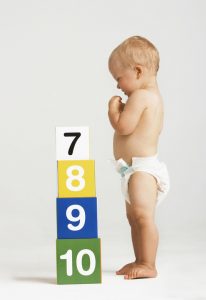 What if there was a better way to introduce math to young kids? For a parent, one of the first math concepts they teach their child is to count to 10. In this exercise, repetition is the name of the game: “Let’s count to 10!…Good! Now, let’s do it again!”
What if there was a better way to introduce math to young kids? For a parent, one of the first math concepts they teach their child is to count to 10. In this exercise, repetition is the name of the game: “Let’s count to 10!…Good! Now, let’s do it again!”
While rote learning of the first 10 numbers is important, it is not sufficient for a child to grasp the deeper meaning behind these numbers, and why they are important to their everyday lives.
Somewhere along the way, we lose an opportunity to take advantage of a critical component of early math development, because so many people are not aware of research on how the brain is wired for math.
Research on math development has long shown the importance of the Approximate Number System (ANS), a cognitive system responsible for estimating quantity without counting. For example, a child (or adult) can often answer questions such as, “Which plate has more grapes on it?” through estimation, without actually counting the grapes on the plate. For these types of judgments, people rely on their ANS.
The ANS is a preverbal system present in infancy and shared between animals and humans. Research shows that children who have a sharper ANS — e.g., those who can discern quantities that are closer together without counting— perform better on standardized math tests. This is surprising, given the apparent differences between estimating (which is inherently approximate) and the more precise, symbolic calculation skills evaluated in math tests, e.g., counting, addition, and subtraction. Nonetheless, the connection runs deep: studies on infants and young children show that ANS precision is a strong predictor of future math achievement, even years later.

Moreover, two recent papers have found evidence for a causal link, showing that ANS practice improves math performance in preschoolers. In one study from last year, researchers at Johns Hopkins University asked 40 five-year-olds to make a series of approximate comparisons between two sets of dots on a computer screen (“which side has more?”; see diagram), where the questions started easier and became harder. Control groups saw the same questions but in a different order. Amazingly, researchers found that children who played with the “treatment” version of the game for just five minutes demonstrated better math performance immediately afterwards (on tests of counting, number identification, addition, etc.), when compared to control groups.
In another recent study involving 103 low-income preschoolers in the Philadelphia area, researchers at the University of Pennsylvania studied the effects of a touchscreen ANS game on early math performance. Their game helped children to practice “approximate arithmetic” — that is, adding and subtracting quantities by estimating rather than counting (see diagram). Children in the treatment group, who played the game for a total of two hours over a two-to-three-week period, scored higher on a standardized math test than children in the control group, who played a picture memory game.
These studies indicate that ANS practice can help preschoolers develop their early math skills, in preparation for formal math education later on. Unfortunately, the ANS software used in the recent studies are research prototypes, and thus unavailable to parents and children who want to use them.
A New Kind of App for Learning Math
Given the importance of early STEM skills and the ubiquity of touchscreen devices amongst young children, my company, Cognitive ToyBox, saw an opportunity to develop an early math game based on this research, making ANS activities accessible to parents and children at home. We knew that simply rebuilding the games, as described in the research papers on ANS, would not provide a sufficiently engaging experience for young learners. In both of the studies, researchers sat alongside the child to encourage him or her to continue going, even if he or she got bored. In order to adapt the research to be appropriate for kids to use at home, our app would need to be engaging enough to stand-alone, without parent involvement (although it is always recommended).

With these guidelines in mind, we built Fuzzy Numbers: Pre-K Number Foundation, a fairytale-themed app with ANS practice activities. To adapt the research for home use, we reimagined the ANS practice concepts as a series of goal-oriented, engaging mini-games. For example, to practice approximating quantities, children attend Princess Poodle’s dinner party and serve her guests the plates with more food (rather than less). To practice approximating addition, children visit Potion School, where they help a student cat choose the cauldron with the same number of ingredients as the total sum in the teacher’s.
After developing the app, we reached out to the researchers, asking whether our app preserves the “magic sauce” that led to performance gains on math tests, and inquiring about possible collaborations.

So far, the response has been very positive. The researchers at University of Pennsylvania plan to use our app to run subsequent, longer-term studies, to better understand the relationship between ANS practice and math performance. Moreover, through remote app deployment, they can reach many more participants outside of the university’s geographic area. It’s a win-win: the researchers have better tools to conduct their studies, and we will be able to quantify the precise impact of our app on math achievement, beyond the existing science that supports ANS practice.
Apps that productize promising early childhood learning research could be transformative for a child’s early learning. Rather than using the “digital candy” that floods the market, children could have the opportunity to play evidence-based apps that foster interest in STEM and set the foundation for later academic success.
And, given the importance of STEM learning to a child’s life outcomes, that’s what counts.
 Tammy Kwan is the co-founder and CEO of Cognitive ToyBox (CTB). The company partners with developmental psychologists to build evidence-based learning apps for children under 5. CTB has received support from the National Science Foundation, the Robin Hood Foundation, and 4.0 Schools. Tammy holds an MBA from NYU Stern and a BA in Psychology from Stanford University. Follow her on Twitter: @tammykwan. Follow Cognitive ToyBox on Twitter: @cognitivetoybox and Facebook https://www.facebook.com/cognitivetoybox/
Tammy Kwan is the co-founder and CEO of Cognitive ToyBox (CTB). The company partners with developmental psychologists to build evidence-based learning apps for children under 5. CTB has received support from the National Science Foundation, the Robin Hood Foundation, and 4.0 Schools. Tammy holds an MBA from NYU Stern and a BA in Psychology from Stanford University. Follow her on Twitter: @tammykwan. Follow Cognitive ToyBox on Twitter: @cognitivetoybox and Facebook https://www.facebook.com/cognitivetoybox/

